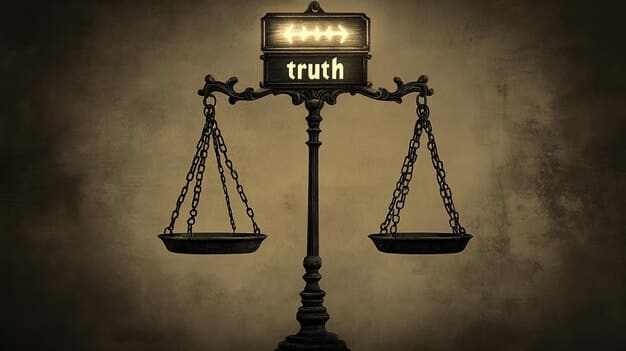Unmasking the True Crime Obsession: Why We’re Hooked

True Crime Obsession: Why Are We So Hooked on These Stories? delves into the deep-seated psychological and societal factors that fuel our fascination with real-life stories of crime, exploring themes of fear, justice, and human behavior.
Why are we so fascinated by true crime? The True Crime Obsession: Why Are We So Hooked on These Stories? is a question that many have pondered. This genre dominates podcasts, television, and books, capturing our attention with tales of the darkest sides of humanity. But what is it about unsolved mysteries, horrific crimes, and the pursuit of justice that holds us captive?
The Psychology Behind Our True Crime Obsession: Why Are We So Hooked on These Stories?
The True Crime Obsession: Why Are We So Hooked on These Stories? often stems from a complex mix of psychological factors. Understanding these can shed light on why so many people are drawn to the genre.
The Appeal of Fear and Anxiety
Humans are naturally drawn to things that evoke strong emotions, and fear is certainly one of them. The controlled environment of consuming true crime allows us to experience fear from a safe distance.
The Need for Understanding
True crime can be a way to try to understand the motivations and behaviors of those who commit heinous acts. This search for comprehension can be a powerful draw.
- Catharsis: True crime can offer a cathartic experience, allowing us to confront our fears and anxieties in a safe and controlled manner.
- Intellectual Stimulation: Many true crime stories involve complex investigations and puzzles, offering a form of intellectual stimulation.
- Social Connection: Discussing true crime cases with others can create a sense of community and shared interest.
In conclusion, the psychological factors behind the true crime obsession are multifaceted, ranging from the appeal of fear to the need for understanding and social connection. Understanding is one of the top reasons for the True Crime Obsession: Why Are We So Hooked on These Stories?

The Societal Impact of True Crime Media
True crime media is more than just entertainment; it impacts society’s understanding of crime, justice, and victimhood. It is important to consider both the positive and negative implications.
Raising Awareness
True crime media can bring attention to unsolved cases, injustices, and systemic issues within the criminal justice system.
Potential for Misinformation
The dramatization of true crime stories can sometimes lead to the spread of misinformation or biased perspectives, affecting public opinion.
The societal impact of the True Crime Obsession: Why Are We So Hooked on These Stories?, lies in its ability to both inform and potentially misinform. Balancing the benefits and risks is crucial for responsible consumption and creation of true crime content.
The Role of Justice and Morality
Our fascination with true crime is often intertwined with our sense of justice and morality. We are drawn to stories that explore right and wrong, good versus evil.
The Desire for Resolution
Many true crime stories revolve around the pursuit of justice and the capture of criminals. This narrative provides a sense of closure and satisfaction.
Moral Curiosity
True crime can raise complex moral questions about the nature of humanity and the circumstances that lead individuals to commit terrible acts. This exploration can be intellectually stimulating and thought-provoking.
- Empathy for Victims: True crime can foster empathy for victims and their families, increasing awareness of the impact of crime on individuals and communities.
- Critique of the System: Many true crime narratives also offer a critique of the justice system, law enforcement, and societal factors that contribute to crime.
- Voyeurism vs. Education: It’s important to distinguish between voyeuristic interest and genuine engagement with the complexities of crime.
The role of justice and morality is central to the appeal of True Crime Obsession: Why Are We So Hooked on These Stories? The presence of this element leads the audience to feel involved and engaged with the happenings.

Gender and True Crime Consumption
Studies have shown that women are more likely to consume true crime media than men. Understanding the reasons behind this disparity can provide additional insight into our true crime obsession.
Empowerment Through Knowledge
Some researchers suggest that women are drawn to true crime because it provides knowledge and strategies for self-protection.
Emotional Connection
The emotional narratives of victims and their families can resonate more strongly with female audiences, fostering empathy and engagement.
The consumption patterns in the True Crime Obsession: Why Are We So Hooked on These Stories? varies with gender, potentially due to differences in safety and self-protection needs. When there is a high emotional connection within the topic, this increases obsession.
Ethical Considerations in True Crime Storytelling
The telling of true crime stories raises ethical questions about the privacy of victims and their families, the potential for sensationalism, and the responsible handling of sensitive information.
Respect for Victims
True crime creators should prioritize the dignity and respect of victims and their families, avoiding sensationalism or exploitation.
Accuracy
Maintaining factual accuracy is crucial in true crime storytelling to avoid spreading misinformation or perpetuating harmful stereotypes.
- Consent: Obtaining consent from victims and their families before sharing their stories is an important ethical consideration.
- Impact on Individuals: True crime can potentially affect the individuals involved in a true crime, it is important to be mindful of this.
Ethical considerations in the True Crime Obsession: Why Are We So Hooked on These Stories? are essential for responsible storytelling. Consideration of ethics is essential.
The Future of True Crime Media
True crime media continues to evolve, with new technologies, formats, and ethical considerations shaping its future. It’s anyone’s guess what the future holds for storytelling and crime.
Interactive Storytelling
Virtual reality and augmented reality technologies could offer immersive true crime experiences, blurring the lines between observer and participant.
AI and Crime Solving
Artificial intelligence could play a role in analyzing crime data, identifying patterns, and potentially solving cold cases.
The future of the True Crime Obsession: Why Are We So Hooked on These Stories? will be shaped by technological advancements and ethical considerations, potentially changing how these stories are told and consumed.
| Key Point | Brief Description |
|---|---|
| 🔍 Psychology Behind It | Fear, understanding, and catharsis drive true crime interest. |
| ⚖️ Role of Justice | True crime appeals to moral curiosity and the desire for resolution. |
| 👩 Gender Dynamics | Women are more likely to consume true crime, seeking empowerment. |
| 🤔 Ethical Factors | True crime must respect victims and maintain factual accuracy. |
Frequently Asked Questions
True crime captivates us through a combination of fear, the desire for understanding, and moral curiosity. The True Crime Obsession: Why Are We So Hooked on These Stories? highlights our innate interest in the darker aspects of human behavior.
Ethical consumption involves respecting victims, verifying information, and avoiding sensationalism. Being mindful and critical is key when engaging with true crime content.
It can raise awareness but also misinform. Responsible true crime media should aim to educate without exploiting victims or spreading inaccuracies about True Crime Obsession: Why Are We So Hooked on These Stories?
Some theories suggest it’s linked to empowerment and self-protection. True crime can provide women with knowledge about potential threats and survival strategies.
The future likely involves immersive technologies and AI in crime-solving. Ethical storytelling will also be critical in shaping how we engage with the True Crime Obsession: Why Are We So Hooked on These Stories? in the years to come.
Conclusion
The True Crime Obsession: Why Are We So Hooked on These Stories? is a complex phenomenon rooted in psychology, sociology, and our innate curiosity. While the genre can be informative and thought-provoking, it’s crucial to consume it responsibly and ethically.





